|
|
|
Sort Order |
|
|
|
Items / Page
|
|
|
|
|
|
|
| Srl | Item |
| 1 |
ID:
105022
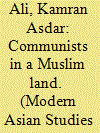

|
|
|
| 2 |
ID:
105024
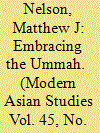

|
|
|
|
|
| Publication |
2011.
|
| Summary/Abstract |
Studies of student politics in Pakistan often focus on the competition between 'secular' and 'religious' student groups-for example, the leftward-leaning National Students Federation, regional parties with a broadly secular orientation like the Pakhtun Students Federation, the Islami Jamiat-e-Tuleba (Islamic Students Association), and sectarian groups like the (Shi'a) Imamia Students Organization. This paper describes the emergence of an increasingly violent stalemate between and amongst these groups since the 1960s. It then argues that for a growing number of students this stalemate produced a certain disenchantment with exclusionary efforts to control the 'state-based Muslim nationalism' that lay behind the formation of Pakistan itself. Seeking alternatives, these disenchanted students developed an interest in non-state-based forms of Muslim solidarity-forms that rejected the constraints of territorial Muslim nationalism in favour of transnational movements focused on the revitalization of Muslim solidarity on a truly global scale-movements like the (Deobandi) Tablighi Jama'at and the (Barelwi) Da'wat-e-Islami. Tracing this development, this paper takes up one application of Talal Asad's argument that alternative expressions of religion (and religious solidarity) are 'produced' by specific political circumstances. It also examines this formulation in the light of other theories that take an interest in the effects-indeed the potentially 'democratizing' effects-of protracted political stalemates.
|
|
|
|
|
|
|
|
|
|
|
|
|
|
|
|
| 3 |
ID:
105029
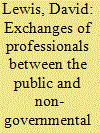

|
|
|
|
|
| Publication |
2011.
|
| Summary/Abstract |
Using recently-collected ethnographic life history data, this paper analyses in historical context the shifting boundary between governmental and non-governmental 'worlds' in Bangladesh. First, the paper explores the ways in which this boundary is an ambiguous one, and aims to show how it is constructed and maintained, through an analysis of new types of 'boundary-crossing' professionals who cross between the two sectors in the course of their career trajectories and their social relationships. Second, it suggests that such movements across this boundary throws light on changing professional identities in Bangladesh, such as what it means to work as a public servant or a development worker. High-achieving university graduates are now less likely to choose civil service careers than they once were, because new opportunities exist for them to work more flexibly as 'non-governmental professionals' in roles that may allow them to combine professional, consultant and activist identities.
|
|
|
|
|
|
|
|
|
|
|
|
|
|
|
|
| 4 |
ID:
105028
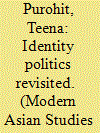

|
|
|
|
|
| Publication |
2011.
|
| Summary/Abstract |
This paper analyzes the political project of secular Islam as outlined by the Indian political and religious leader, Muhammad Shah-also known as Aga Khan III (1877-1957). As first president of the All India Muslim League, Muhammad Shah facilitated the installation of separate electorates for Muslims as well as the call for Partition. The reformist notion of Islam he invoked for this separatist programme was informed by the secular and modernizing projects of the colonial public sphere. Simultaneously, however, Muhammad Shah claimed a divine role as Imam of the Ismaili Muslim community-a position validated by Ismaili beliefs and teachings of messianic Islam. The paper engages Muhammad Shah's writings and the devotional texts of the Ismailis to illustrate how the heterogeneous forms of practices peculiar to the vernacular history of Islam in early modern South Asia were displaced by the discourse of religious identity in the colonial period.
|
|
|
|
|
|
|
|
|
|
|
|
|
|
|
|
| 5 |
ID:
105025
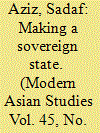

|
|
|
|
|
| Publication |
2011.
|
| Summary/Abstract |
This paper takes a critical look at a recent attempt by the Pakistani state to manage religious thought and practice, under the broad banner of 'Enlightened Moderation'. One of the key Islamic thinkers associated in popular imagination with this project is Javed Ahmed Ghamidi. In contextualizing the work and role of Ghamidi, it is tempting to work backwards from his opinions on Islamic truth to situate him as a reformer whose interventions are primarily oriented to the task of reconciling Islam to conditions of liberal modernity. Against such a tendency it is argued here that such an exercise of classification and categorization needs to be undertaken with greater care as against a critique of the imperialist typology of 'good' and 'bad' Islams, a project of delineating authentic from inauthentic Islams has also more recently been activated.
|
|
|
|
|
|
|
|
|
|
|
|
|
|
|
|
| 6 |
ID:
105026
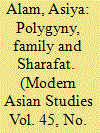

|
|
|
|
|
| Publication |
2011.
|
| Summary/Abstract |
While historians of South Asia have examined in elaborate detail critiques of sati and child marriage in the Hindu community, a similar approach to Muslim familial reform also needs serious attention. By investigating discourses on the question of polygyny, this paper is an attempt in this direction. In the light of these discourses, the paper argues that polygyny, influenced by modern sensibilities of reform and social change, underwent different interpretations during the colonial period. The debate on polygyny was not homogenous and uniform and research reveals a plurality of viewpoints on the subject. The argument was often based on an assumption of sexual difference which, in some cases, emphasized the infertility and reproductive incapacity of the first wife, and in others, presented an idealization of domestic ideology where the second wife made the 'perfect' home. Simultaneously, there were also strong critiques of polygyny by women writers who underscored the misery of the first wife. These debates do not necessarily settle the question in favour of a particular position, but reflect a conversation held on marriage, children and family, and express how love, conjugality and affection were narrated in the public sphere.
|
|
|
|
|
|
|
|
|
|
|
|
|
|
|
|
| 7 |
ID:
105021
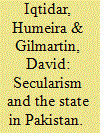

|
|
|
| 8 |
ID:
105023


|
|
|
| 9 |
ID:
105027


|
|
|
|
|
| Publication |
2011.
|
| Summary/Abstract |
The earliest writings of Sir Syed Ahmad Khan (1817-1898), the famous Muslim social reformer and educationist, were in the field of History, including two books on the monuments and history of Delhi that bear the same title, Asar-al-Sanadid. This paper compares the first book, published in 1847, with the second, published in 1854, to discover the author's ambitions for each. How do the two books differ from some of the earlier books of relatively similar nature in Persian and Urdu? How radically different are the two books from each other, and why? How and why were they written, and what particular audiences could the author have had in mind in each instance? How were the two books actually received by the public? And, finally, what changes do the two books reflect in the author's thinking? These are the chief questions that this paper seeks to explore.
|
|
|
|
|
|
|
|
|
|
|
|
|
|
|
|
|
|
|
|
|